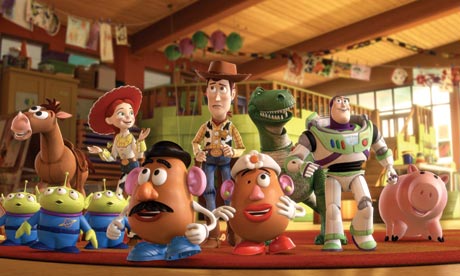
After what looked like being a bleak year in the cinemas, a generally acknowledged masterpiece has finally stormed our screens. In Toy Story 3, we at last have a film that's knocking dead both audiences and critics. Or perhaps not quite at last. Shrek Forever After did much the same kind of job. The performance of these two wasn't unexpected; nonetheless, other much-anticipated films have disappointed. Inception was baffling and Eclipse was vomit-inducing. Sex and the City 2 was a letdown. Even Woody Allen's long-awaited return to form failed to materialise.
Look back over the year to date and a bit of a theme can be detected. The likes of Prince of Persia, The Wolfman, Clash of the Titans, Hot Tub Time Machine, The Bounty Hunter and Shutter Island made less of a splash than you might have thought they would. Punching above their expected weight were Alice in Wonderland, Alvin and the Chipmunks: The Squeakquel, Nanny McPhee and the Big Bang and How to Train Your Dragon. It's family films that seem to be doing the biz.
This may become more obvious should The Karate Kid, The Last Airbender, Despicable Me and, one of the year's biggest surprises, Diary of a Wimpy Kid, do as well here as they have across the pond. Perhaps we shouldn't be too surprised by all this. Look back at last year's score sheet. Obviously Avatar ruled the roost, but the runners-up at the box office were Harry Potter and the Half-Blood Prince, Ice Age 3 and Up, not The Twilight Saga: New Moon, Transformers: Revenge of the Fallen or The Hangover.
Such indicia fly in the face of conventional wisdom. We've been led to believe the cinemas are in thrall to explosion-addicted teenage fanboys and their romance-besotted girlfriends. Children were supposed to have been banished long ago, together with their fuddy-duddy parents. What's happened?
An obvious explanation appears to present itself. Some of the family films we get nowadays are actually good. In comparison, many of the actioners, romcoms, gross-out comedies and CGI spectaculars seem wearyingly clapped out.
As has been widely noted, Toy Story 3 can make strong men weep. It's endlessly imaginative, proficiently plotted, emotionally electrifying and ever so funny. Family film or not, it's actually a great deal more grown-up than most of its current companions at the plexes. By any reasonable standard, Up was better than Avatar, just as How to Train Your Dragon knocked spots off Clash of the Titans. Yet to say that family films are better than those of other genres is merely to displace the puzzle. Why should they be?
Paradoxically, a clue can perhaps be found in the way that apparently awful products like the last two Twilights or Transformers manage to succeed at the box office. These films enjoy the blind support of fanatical fanbases who, it seems, will put up with any old rubbish. They just don't have to be good.
Bad family films, on the other hand, face a problem. You might be able to stuff garbage down the throats of tots who don't know any better; yet the kids won't make it to the cinemas in the first place unless their parents choose to take them. Grown-ups expect to be entertained themselves, not just to sit rigid with boredom alongside their darlings. A family film must therefore reach out across the generations. To pull off this trick, it may need to resort to elsewhere-forgotten devices like drama, storytelling, character and wit.
Maybe this is why family films loom so large among the all-time triumphs of the cinematic canon. Perhaps when Hollywood threw out the Hays Code in 1968, it lost sight of something important. Thereafter, film-makers sought the edge, rather than the homely centre. At first, that meant nudity, gore and challenging themes. Then it seemed to go on to mean ever bigger bangs, ever more extravagant spectacle and ever soppier Jennifer Aniston vehicles. Now, however, family titles seem to be finding out how to combine intelligence and emotional depth with the universal appeal of Snow White and the Seven Dwarfs, It's a Wonderful Life or The Sound of Music.
For society as a whole, this could prove a godsend. At last, parents may be able to reclaim the offspring they've lost to bedroom-TV, videogaming and social networking, and reintroduce them to the kind of genuinely familial experiences that the picture houses provided in the 1930s.
And for the movies? If family film-makers can show their peers how to do their job, they'll deserve our undying gratitude.







